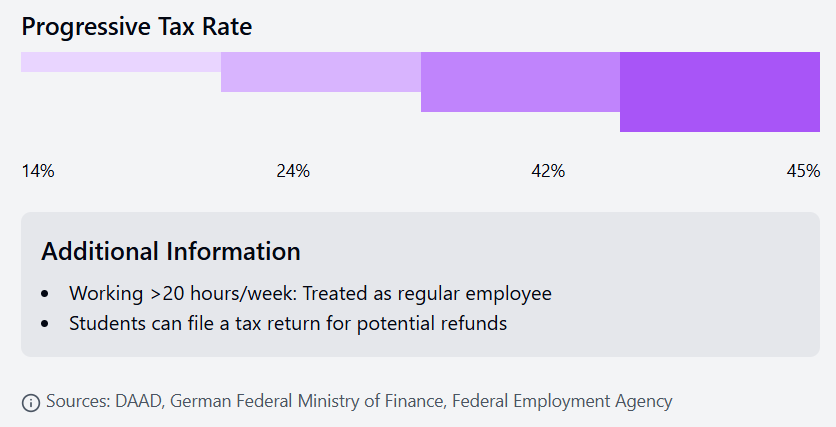.png?h=35&w=35&mode=stretch)
Yatin Kumar Study Abroad Content Specialist
Study Abroad Content Specialist
Highlights:
- Average wage: 12.41 EUR/hour (1,140 INR).
- No taxes if earnings stay below 522 EUR or 47,961 INR /month.
- 120 full days or 240 half days rule for international students.
- Best jobs: Research assistants, library staff, retail, tutoring.
- Use job portals, university networks, and word of mouth to find jobs.
- On-campus jobs have no work-hour limitations (e.g., student assistants).
- Earnings higher than 1,300 EUR (119,477 INR) may affect student insurance.
Part-time jobs in Germany are an excellent way for international students to support their living expenses while gaining valuable work experience. These jobs not only help financially but also enhance your CV and give you insight into Germany’s professional culture. As an international student studying in Germany, you’re allowed to work part-time, making it possible to manage both your studies and your job effectively.
On average, international students spend around 1,600 EUR per month on living expenses, according to 2024 data, which can vary depending on the city. The Federal Statistical Office of Germany estimates that a one-person household needs 1,734 EUR per month to cover all costs. With the rising cost of living, part-time jobs help students manage their expenses better.
- 5 Easy Steps to Finding Part-Time Jobs in Germany
- Working Part-Time in Germany: Key Rules for International Students
- How Do International Students Find Part-Time Work?
- What’s the Process of Finding a Job in Germany?
- How Much Do Part-Time Jobs in Germany Pay in 2024?
- Tax System for International Students in Germany
- Best Part-Time Jobs for International Students in Germany
- FAQs
5 Easy Steps to Finding Part-Time Jobs in Germany
Finding a part-time job in Germany as an international student might seem daunting at first, but it becomes easier once you follow these five simple steps:
- Know Your Working Rights: International students can work 120 full days or 240 half days per year. This equates to about 20 hours per week during the semester. Academic jobs such as research assistants are exempt from this limit.
- Check University Career Centers: Many top universities in Germany have career service centers offering job listings specifically for students. They’re a great place to start.
- Network with Fellow Students: Your peers might know of job openings or recommend you for positions.
- Utilize Online Job Boards: Websites like Stellenwerk.de, Indeed.de, and StudentJob.de are popular platforms for finding part-time jobs in Germany.
- Apply Early: Competition for part-time jobs can be stiff, especially in bigger cities like Berlin and Munich, so start your search early.
Pro Tip: It’s always helpful to learn some basic German even if you’re in an English-speaking job. It can open more opportunities and improve your experience.

Working Part-Time in Germany: Key Rules for International Students
To ensure you're following Germany’s labor laws, here are the essential regulations international students must follow:
- Working Hours: International students are permitted to work up to 120 full days (8 hours/day) or 240 half days (4 hours/day) per year. This limit applies to jobs during the academic semester, ensuring students have enough time for their studies.
- Full-Time Work: During official semester breaks, students are allowed to take up full-time employment without limitations on the number of hours they can work. This is an opportunity for students to earn extra money without breaching work restrictions.
- Academic Jobs: Positions like research assistants or student tutors are often exempt from the 120 full-day rule. These jobs are classified under academic employment, meaning students can work more without facing the same limitations as other part-time roles.
- No Freelancing: As of 2024, international students are prohibited from engaging in freelance or self-employment work unless they obtain a special permit from German authorities. This is to ensure that students do not violate labor laws intended to protect the German workforce.
- Tax-Free Earnings: Students earning less than €520.50/month (₹47,809) are not required to pay taxes. However, any income above this limit may be subject to taxation and social security contributions, depending on the work arrangement.
- Max 20 Hours/Week: Students can only work a maximum of 20 hours per week during the academic semester to avoid being considered full-time employees, which would require them to pay full social security contributions such as health, unemployment, and pension insurance.
- Compliance: It is essential to follow these rules strictly. Violations can result in severe penalties such as fines, loss of student visa, or even deportation. Students must ensure they are aware of these laws to avoid jeopardizing their stay in Germany.

Part-time working hour limits/week
How Do International Students Find Part-Time Work?
Finding part-time work in Germany is about being resourceful and proactive. Here’s how most students land jobs:
- University Networks: Start with university job boards or career fairs.
- Job Portals: Use websites like Xing (Germany’s LinkedIn), Glassdoor, and Indeed.
- Direct Applications: Companies often list student positions directly on their websites. Keep an eye on their “Careers” page.
- Local Listings: Check bulletin boards and online forums in your local area.
- Word of Mouth: Leverage personal connections, especially with fellow students and professors.

Check out: Requirements to Study Masters in Germany for Indian Students
What’s the Process of Finding a Job in Germany?
Landing a part-time job in Germany follows a fairly standard process:
- Prepare Your Documents: You’ll need a well-crafted resume (preferably in both English and German) and a cover letter that highlights your skills and experience.
- Apply Online: Submit your applications through job portals or company websites.
- Attend Interviews: Depending on the job, you may be asked to attend an interview. Don’t forget to bring copies of your visa, residence permit, and enrollment certificate.
- Work Contract: If selected, you’ll be given a work contract, outlining your role, hours, and salary.
Pro Tip: Use a professional photo on your CV as it is the norm in Germany.
How Much Do Part-Time Jobs in Germany Pay in 2024?
The average part-time wage in Germany is 12.00 EUR (1,102 INR) per hour as of 2024, but it can vary based on the job type and region. Here’s a quick look at the pay scale for different part-time roles:
| Job Type | Hourly Wage (EUR) | Hourly Wage (INR) |
|---|---|---|
| Waitstaff | 12.00 EUR | 1,102 INR |
| Academic Assistant | 13.50 EUR | 1,240 INR |
| Retail Cashier | 11.50 EUR | 1,057 INR |
| Delivery Person | 11.00 EUR | 1,010 INR |
| Tutor (Private) | 15.00 EUR | 1,378 INR |
Check out: Jobs After MBA in Germany for International Students
Tax System for International Students in Germany
Minijob (Up to €520/month)
- Tax Exempt
- No social security contributions
- Possible health insurance contribution
Midijob (€520 - €2,000/month)
- Reduced social security contributions
- Income tax applies (depends on earnings)
Above €2,000/month
- Full social security contributions
- Income tax applies (progressive rates)
Minijob < €520 -> Midijob €520 - €2,000 -> Full-time > €2,000

Best Part-Time Jobs for International Students in Germany
| Sector | Part-Time Jobs | Wages (€/hour) | Description |
|---|---|---|---|
| Service Sector | Waiter/Waitress, Bartender, Hotel Staff, Cashier | €12 - €14 (₹1,102 - ₹1,285) | Jobs in restaurants, bars, and hotels; often involve shift work |
| Tutoring | English Tutor, Subject Tutor, Private Tutor | €15 - €20 (₹1,378 - ₹1,836) | Teaching fellow students or children in various subjects |
| On-Campus Jobs | Research Assistant, Library Assistant, University Café Worker | €13 - €16 (₹1,194 - ₹1,469) | Assist professors, manage library operations, or work in campus cafés |
| Retail | Sales Associate, Cashier, Customer Service Representative | €12 - €14 (₹1,102 - ₹1,285) | Assist with sales, stocking, or handling customer queries in stores |
| Delivery Jobs | Food Delivery Driver, Parcel Delivery | €12 - €15 (₹1,102 - ₹1,378) | Deliver packages or food orders within cities |

Check out: Intakes in Germany 2025: Application Deadlines for International Students
Finding a part-time job in Germany can be the key to balancing both your financial and educational responsibilities. The opportunities are vast, from working at cafes to assisting in academic research. Always remember to stay within the legal limits of your visa and ensure you maintain a healthy balance between work and studies. By following this guide, you’ll be well on your way to securing a rewarding part-time role in Germany in 2024.
FAQs
Ques. How many hours can international students work in Germany?
Ans. International students can work up to 120 full days or 240 half days per year, which averages 20 hours per week during the semester.
Ques. What’s the minimum wage for part-time jobs in Germany?
Ans. The minimum wage for part-time jobs is 12.00 EUR (1,102 INR) per hour as of 2024.
Ques. Do international students have to pay taxes in Germany?
Ans. You won’t need to pay taxes if your monthly earnings are below 520 EUR (47,767 INR). Anything above that will require standard income tax deductions.
Ques. Can international students freelance in Germany?
Ans. No, freelancing is generally not allowed for international students unless they get a special permit.
Ques. How much can international students earn while working part-time in Germany?
Ans. Most students earn anywhere between 520 EUR (47,767 INR) and 1,300 EUR (119,418 INR) per month, depending on the type of job and hours worked.


1720696657.png?tr=w-305,h-145,c-force?h=40&w=40&mode=stretch)












Comments